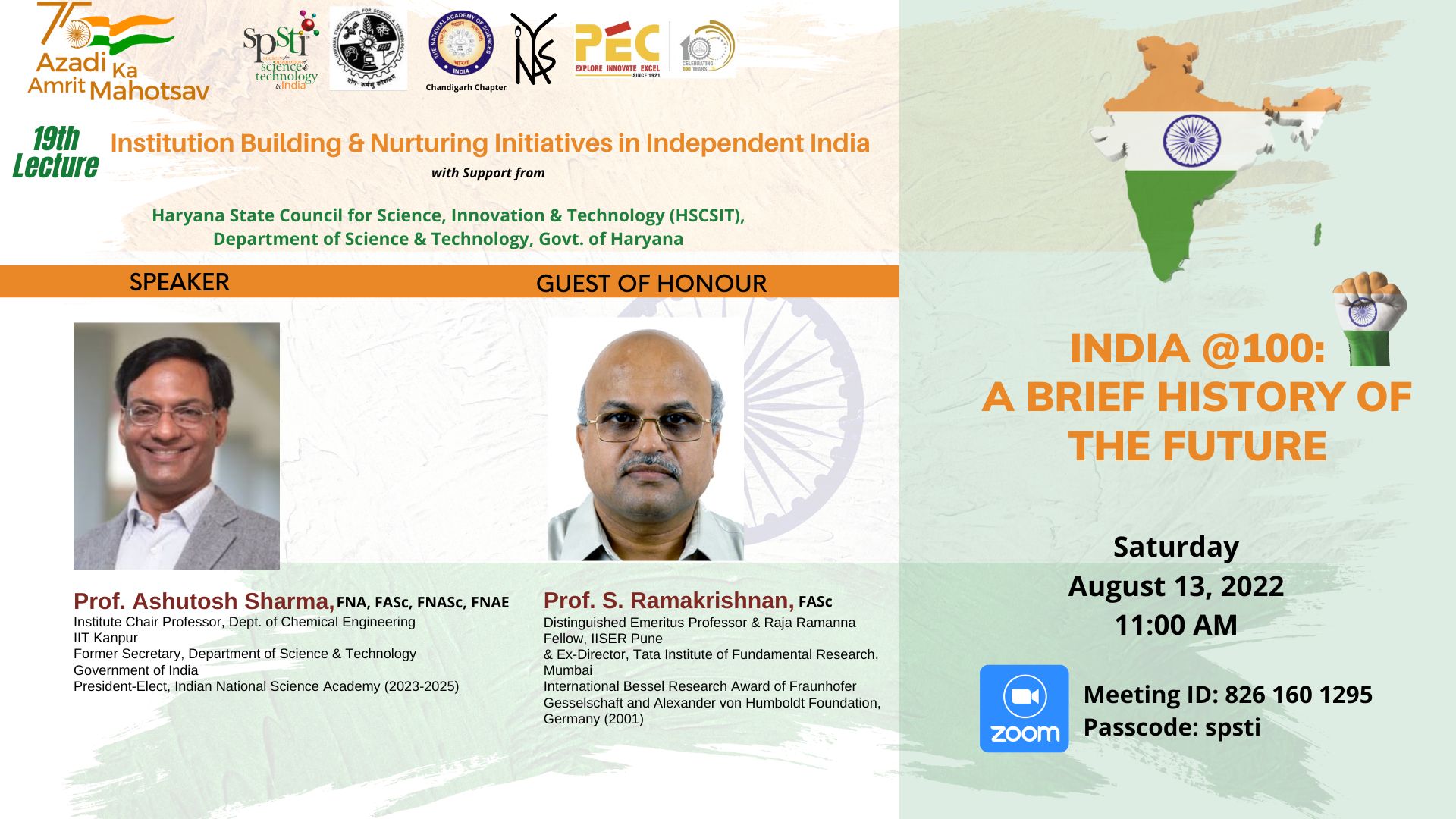The yearlong lecture series “Institution Building & Nurturing Initiatives in Independent India” jointly organized by SPSTI and Chandigarh Chapters of NASI, INSA and PEC to celebrate the Aazadi Ka Amrit Mahotsav, concluded with the 19thlecture held today on “India @100: A Brief History of the Future”. The lecture was delivered by Prof. Ashutosh Sharma, Former Secretary of the Department of Science& Technology, Govt. of India and Prof. S. Ramakrishnan, Distinguished Emeritus Professor & Raja Ramanna Fellow, IISER Pune were invited as Guest of Honour. The lecture series was organized with support from Haryana State Council for Science, Innovation & Technology (HSCSIT), Dept. of Science & Technology, Govt. of Haryana. Coordinated by Prof. Arun K. Grover, former Vice Chancellor of Panjab University and Vice President of SPSTI, the program witnesses eminent scientists, academicians and administrators as speakers and guests of honour from prestigious institutions of the Country, UGC, NCERT, AICTE, DRDO, CSIR, IISERs, IITs, to name a few. Prof. Ramakrishnan talked briefly about the developments of IISc and TIFR. The Giant Meter Radio Telescope is one of the best telescopes and 50% of its time is used by researchers from abroad. Prof. Ashutosh Sharma delivered enlightening, informative and thought-provoking talk on the achievements, challenges and strategies to strengthen the STI ecosystem of India. He talked about the role of institutions – IITs, AIIMs, IISERs, NIDs; revolutions in food, water, sanitation; prominent programs Swachh Bharat, Har Ghar Jal, and technologies that helped India hold a position of global power. He emphasized that the next 25 years cannot be a routine for India and should be taken as a single time frame and not in fragments for growth in various fields in society. He shared the three ways of addressing the problems in general – ‘Jugaad’ meant with finding an optimal solution to any problem, ‘Dhanda’ being a stable and continuous growth in businesses and ‘Panga’ being disruptive ways of solving problems. He discussed the role of various DST’s innovations, taking it as a pyramid with base from schools to the top. He discussed India’s mission on Interdisciplinary technologies for seamless ecosystem for social and economic transformations through education, skill, R&D, S&T development for incubation of knowledge and products in the context of ‘Atmanirbharta’.His anxiety for optimistic stories/effort, needs of society and also limitations really made concern. Prof. R.K. Kohli, Vice Chancellor, Amity University and Chairman NASI, Chandigarh Chapter presented concluding remarks for the lecture series. The lecture was attended by many eminent members, Prof. S Anantha Ramakrishna, Director, CSIO, Prof. Anand Bachhawat, Ms. Rajni Bhalla, Prof. Yogesh, Prof. K.K. Bhasin, and many other members of the public. New Lecture Series will commence on Teacher’s Day September 5, 2022, and the first lecture shall be delivered by Director, PGIMER Prof. Dr Vivek Lal and he will share the vision for PGIMER in run up to India@100.
About the Speaker
Prof. Ashutosh Sarma is a visionary academician who has made exceptional interdisciplinary contributions in nanosciences and nanotechnology fields. From 2015-2021, he served as the Secretary, Department of Science and Technology, Government of India. He is currently the Institute Chair Professor & Founding Coordinator of Nanoscience Centre and Advanced Imaging Centre at IIT Kanpur. He is an Associate Editor of ACS Applied Materials and Interfaces since 2014. He is a recipient of the prestigious Shanti Swarup Bhatnagar Award (2002) in engineering sciences for his “original pioneering contribution to the understanding of the behavior of thin films and other highly confined nanoscale systems.” He was conferred with the inaugural Infosys Prize in 2010 for Engineering and Computer Science in recognition of his fundamental contributions to the fields of surfaces and interfaces, adhesion, pattern formation, nanocomposites, materials science, and hydrodynamics, which have practical applications in such areas as energy storage, filtration, micro-electro-mechanical systems (MEMS) and optoelectronics. He is conferred with numerous other awards including the TWAS Prize (2008), Distinguished Alumnus Awards of IIT Kanpur (2007) and SUNY Buffalo, Homi Bhabha Award of the UGC (2007), Bessel Research Award of Alexander von Humboldt Foundation, Germany (2006) and Lifetime Achievement Award of The Indian Science Congress Association (2010), among many others including several DSc honoris causa.
Watch Complete Session

